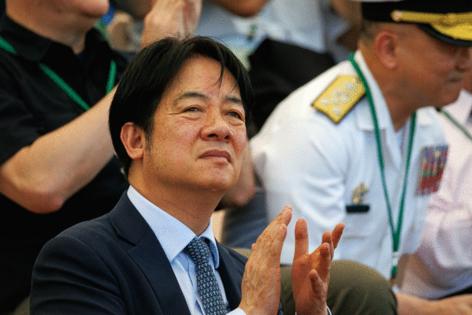Taiwan is courting MAGA influencers to get Trump's attention
Published in News & Features
TAIPEI, Taiwan — Taiwanese officials are courting podcasters and influencers aligned with Donald Trump as they grow more worried the U.S. leader could undermine the self-ruled democracy’s interests in talks with China, according to people familiar with the matter.
Trump has said Taiwan will likely be on the agenda when he’s expected to meet President Xi Jinping next week in a bid to resolve persistent trade tensions. China has asked the White House to officially declare it “opposes” Taiwan independence, Bloomberg reported last month, a concession that would mark a major diplomatic win for Beijing.
Taiwanese President Lai Ching-te and his top officials have given a blitz of interviews to conservative U.S. figures in recent months, using those platforms to promote Taiwan’s security issues to so-called MAGA audiences. During such appearances, they’ve touted the common democratic values underpinning ties with the U.S., and encouraged deeper trade and investment links.
The strategy aims to elevate Taiwan on Trump’s agenda, said the people, who asked not to be identified discussing private information. Unlike other leaders, Lai is restricted from one-to-one contact with the U.S. president. Even so, the outreach has surprised some officials in Taipei, with one saying it reflects urgency on Lai’s part to reach out to the Republican leader.
“Lai’s full-court press across conservative U.S. media reflects Taipei’s rising anxiety over President Trump’s intentions,” said Bloomberg Economics’ Adam Farrar. “Even (the Taiwan Semiconductor Manufacturing Company's) multibillion-dollar U.S. investments haven’t clearly strengthened Taiwan’s standing in Washington,” he added, referring to the chip giant’s latest $100 billion pledge.
In response to questions, Taiwanese Foreign Ministry spokesman Hsiao Kuang-wei said the island’s ties with the U.S. were built on a “foundation of bipartisan support.”
“Taiwan has consistently maintained broad engagement with both major U.S. parties and actively cultivated friendly ties across various sectors,” he added.
The U.S. has encouraged Taiwan officials to engage with new media outlets so they can converse with real Americans instead of liberal elites, a Trump administration official said in a statement. This is not an indication of worries about the administration’s policies, the person added, noting that Taiwan and the U.S. are deeply partnered in security, technology, manufacturing and education.
Lai and his deputy have featured on two podcasts with conservative U.S. hosts in recent months, including one where Taiwan’s president made an appeal to Trump that standing by the island would help him win a Nobel Peace Prize.
“If Taiwan is annexed, China will become even more powerful in competing with the U.S.,” Lai told "The Clay Travis and Buck Sexton Show" earlier this month. “This will also impact America’s own national interests.”
The host said he’d spent about a week in Taiwan around recording the program and dedicated air time to praising the island’s safety record, contrasting its low crime rate to U.S. cities like Chicago. Days later, the podcast hosted Eric Trump, the president’s son, although they didn’t discuss China or Taiwan.
Alexander Yui, Taiwan’s de facto ambassador to the U.S., has led the charge from Washington. Appearing on Steve Bannon’s War Room podcast, Yui told Trump’s former White House chief strategist the “diplomatic trenches are being fought very hard.” He’s followed that up with turns on Fox News and by dining with former Navy SEAL Shawn Ryan, whose interview with Trump last year racked up some 4.6 million views.
While the U.S. remains Taiwan’s biggest military backer, there have been signs Trump’s support could be wavering, as China hawks who once restrained his transactional foreign policy increasingly take a back seat.
In July, Lai called off an overseas trip after Washington denied his request to transit in New York. Weeks later, Trump halted a military aid package for Taiwan worth more than $400 million. Around the same time, Beijing stepped up pressure on the U.S. to officially say it opposes Taiwan independence, which would upend decades of strategic ambiguity.
The U.S. remains committed to its one China policy, and to preserving peace and stability in the Taiwan Strait, a State Department spokesperson said in a statement.
China rejects any official engagement between the U.S. and Taiwan, which it sees as a breakaway territory, and has reacted strongly in recent years to any interactions that test those boundaries. In 2022, it responded to then-House Speaker Nancy Pelosi’s visit to Taipei by firing missiles over the main island and encircling it with unprecedented military drills.
Although Trump upended decades of delicate diplomacy when he had a phone call with former Taiwanese President Tsai Ing-wen after winning the 2016 election, since then he hasn’t spoken with a leader from the island democracy.
Lai’s Democratic Progressive Party has little in common with Trump’s MAGA agenda, championing left-leaning social values that helped Taiwan become the first Asian democracy to legalize same-sex marriage. That has led to some awkward exchanges.
In October, Matt Schlapp, who chairs the Conservative Political Action Conference, was invited to deliver a keynote speech at the Taipei Security Dialogue, which is organized by a research group affiliated with the island’s Defense Ministry.
Schlapp spent nearly seven minutes attacking wokeness and undocumented immigrants in the U.S. during his half hour address, shocking some delegates who expressed concern he was treating the event like a MAGA rally. On the sidelines of that event, Schlapp told Bloomberg News that before this year Taipei had never reached out to his organization.
Taiwan is now trying to balance its identity as a progressive democracy with the need to strengthen connections with Trump, said William Yang, senior analyst for Northeast Asia at the International Crisis Group.
While that might trigger criticism at home, he added, “it reflects the Taiwan government’s pragmatism in managing relations with the U.S. at a time of growing uncertainty.”
_____
©2025 Bloomberg L.P. Visit bloomberg.com. Distributed by Tribune Content Agency, LLC.







Comments